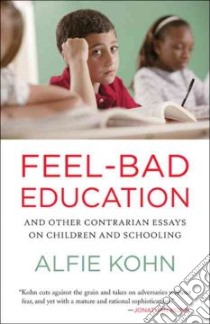- Libreria
- >
- Libri in lingua
- >
Feel-bad Education - 9780807001400
Un libro in lingua di Alfie Kohn edito da Beacon Pr, 2011
- € 13.40
- Il prezzo è variabile in funzione del cambio della valuta d’origine
Mind-opening writing on what kids need from school, from one of education's most outspoken voices
Arguing that our schools are currently in the grip of a “cult of rigor”—a confusion of harder with better that threatens to banish both joy and meaningful intellectual inquiry from our classrooms—Alfie Kohn issues a stirring call to rethink our priorities and reconsider our practices.
Kohn's latest wide-ranging collection of writings will add to his reputation as one of the most incisive thinkers in the field, who questions the assumptions too often taken for granted in discussions about education and human behavior.
In nineteen recently published essays—and in a substantive introduction, new for this volume—Kohn repeatedly invites us to think more deeply about the conventional wisdom. Is self-discipline always desirable? he asks, citing surprising evidence to the contrary. Does academic cheating necessarily indicate a moral failing? Might inspirational posters commonly found on school walls (“Reach for the stars!”) reflect disturbing assumptions about children? Could the use of rubrics for evaluating student learning prove counterproductive?
Subjecting young children to homework, grades, or standardized tests—merely because these things will be required of them later—reminds Kohn of Monty Python's “getting hit on the head lessons.” And, with tongue firmly in cheek, he declares that we should immediately begin teaching twenty-second-century skills.
Whether Kohn is clearing up misconceptions about progressive education or explaining why incentives for healthier living are bound to backfire, debunking the idea that education reform should be driven by concerns about economic competitiveness or putting “Supernanny” in her place, his readers will understand why the Washington Post has said that “teachers and parents who encounter Kohn and his thoughts come away transfixed, ready to change their schools.”
Informazioni bibliografiche
- Titolo del Libro in lingua: Feel-bad Education
- Sottotitolo: And Other Contrarian Essays on Children and Schooling
- Lingua: English
- Autore: Alfie Kohn
- Editore: Beacon Pr
- Collana: Beacon Pr (Paperback)
- Data di Pubblicazione: 05 Aprile '11
- Genere: EDUCATION
- Argomenti : Public schools United States Education Aims and objectives United States
- Pagine: 215
- ISBN-10: 0807001406
- EAN-13: 9780807001400


